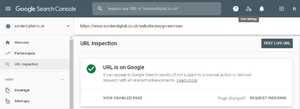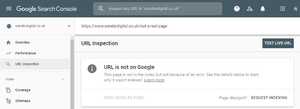How Long Does it Take For A Website to Show in Google?
Of course you want your website to rank on Google!
What's the point of a new website if no one can find it?

My new website has just launched and is finally live!
But I've just checked and can't see it on Google, what's gone wrong?A common question we are asked when we launch new websites, how long before my website shows on Google? The short answer is it depends - it can take anything from hours to weeks for the pages on your site to be indexed at all.
When people ask that question, they often don't mean indexed at all - they mean pages ranking for keywords that they think they should rank for. There's an entire area of marketing that aims to get your website into Google's search results - it's called Search Engine Optimisation (SEO).
Note: There's a lot of variables that determine if your site will rank for specific search queries, from its design for mobile devices to the text: HTML ratio. If you're going to be relying heavily on organic search traffic then we suggest you build your website with SEO in mind. After your website is complete there are things you can do to help Google index your site, but it will take a lot of work to rank for competitive keywords.
How To Show Your Website on Google
What Needs to Happen
There are two key steps where Google first find and review your site, and then catalogue that information - here's the technical specifics:
- In order to get your website to show in results, the aptly named Googlebot needs to find and crawl your website. Google uses its own search software to collect information on your website and find out what it's all about.
- This information is then indexed. This is essentially Google taking the words and images on the website and putting them into its own filing system.
So why doesn't this happen straight away? The webmaster (whoever built the website) needs to create and submit a sitemap to Google Search Console (GSC, previously Google Webmaster Tools), which basically says to Google 'look here, we have something new!'.
How To Make It Happen
If we built your website, all of our sitemaps have web addresses like this: www.YourWebsite.co.uk/sitemap.xml. To open a search console account you can prove ownership of the site by linking it to your Google Analytics account or adding text into the code. Once you have the account you can submit your sitemap URL (address). If you're not technically minded then we recommend asking for help from your web design company or marketing agency.
If you work with us, we can create your sitemap and GSC account for you, then submit your sitemap so you don't need to worry. Once that's been done, it's normally not too long before Google will show your website in its results.
Top Tip
Just because Google is the top dog when it comes to search doesn't mean you should ignore the number two search engine, Bing. You should also ensure you're indexed with Bing Webmaster tools in the same way you have done for Google (create an account, submit the sitemap).

How Long Before Google Crawls My Site?
So you've submitted your sitemap to Google. Now Google will work out how important your website is and whether or not to prioritise crawling and indexing the site.
Google takes into account how many different websites are linking to your website. These are your backlinks. It uses this information to decide how important your site is compared to the billions of other websites it needs to index.
If you've built a brand new website, it's unlikely you'll have many external links just yet.
Top Tip
What you can do is update all of your social media profiles and make sure the new website is included and linked to in any relevant places. The more relevant and useful links from other websites you can get, the easier you'll be to find.
How Will I Know When I'm Ranking?
Once your website is indexed, you probably won't rank for specific keywords right away. You can try searching your brand name, which should show your site - unless your brand name happens to be a popular keyword with lots of competition.
An easy way to find out if you have been indexed without scrolling through results pages, you can put 'site:' before your web address, site:YourWebsite.co.uk, and type that into the search bar of Google or Bing. If different pages of your website show in the results, it means Google has successfully crawled your site.
At Sonder Digital, we recommend waiting at least a week to see if your website is listed on Google. It may be quicker, but it could be slower! Once your website is listed on Google, you should start to see some organic traffic, the amount of traffic will depend on your optimisation (SEO) and you should start thinking about keyword research.
My New Page Hasn't Been Indexed
Your website might be indexed, but perhaps a new blog post that you've added doesn't appear to have been indexed yet. You can check it's not indexed by using the site operator similar to above; site:YourWebsite.co.uk/web-page-slug; and see if the page is in the results.
If your page has not been indexed, and you want it to be indexed asap, you need to go into your Google Search Console and use the URL inspector to check if there are errors, or to request indexing.


Google doesn't just crawl your site once, it will crawl your site periodically from the day it first finds it to the day it no longer exists. The frequency with which your website is crawled depends on the frequency with which you add new content.

Need A Hand?
If you're struggling to work on your SEO (search engine optimisation) alone then you can check out the other blog posts we've written on the subject below or get in touch.
We've got over 50 years of experience in marketing between us so we've seen a huge variety of SEO issues and solutions. We don't bite, we can take a look and see what's going on with your organic traffic for you, and fix it if your site isn't showing at all.
If you'd like one of our SEO experts to take the whole headache off your hands then check out our SEO packages for getting your website found in search engines.
Other Relevant Resources
There's always more to learn, we recommend these blogs:
Posted by Rob Fellingham on March 29th 2021




